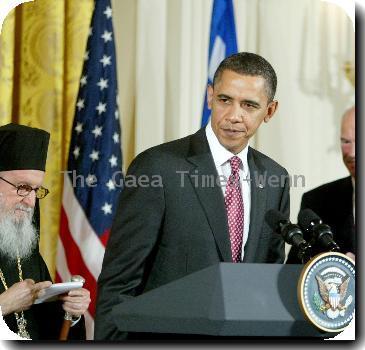Palestinian approval clears way for indirect talks with Israel, Obama’s first peace initiative
By Karin Laub, APSaturday, May 8, 2010
Palestinian approval clears way for Mideast talks
RAMALLAH, West Bank — Formal Palestinian approval of indirect talks with Israel cleared the way Saturday for President Barack Obama’s first sustained on-the-ground attempt to bring peace to the Middle East.
White House envoy George Mitchell will try in four months of shuttle diplomacy to rebuild trust between Israeli and Palestinian leaders and narrow some of their vast differences, in hopes of nudging them toward direct negotations.
However, expectations are low and obstacles seem insurmountable. The Israelis and Palestinians remain far apart on what a Palestinian state should look like. Negotiations are being overshadowed by Israel’s refusal to halt settlement construction on war-won land, and the rule of the Islamic militant Hamas in the Gaza Strip, one of the territories that would one day be part of a Palestinian state.
The indirect format also looks like a big step backwards, following 16 years of direct, if intermittent, negotiations, including frequent meetings just two years ago between Palestinian President Mahmoud Abbas and Israeli Prime Minister Benjamin Netanyahu’s predecessor.
But Abbas has said he will not hold direct talks until Israel stops all settlement construction in the West Bank and east Jerusalem, the sector of the city Palestinians claim as a future capital. Israel has only agreed to a temporary slowdown in the West Bank, but not in east Jerusalem.
The indirect talks were devised as a compromise, but the arrangement was thrown into doubt in March when Israel announced new plans to build 1,600 homes for Jews in east Jerusalem. The decision, which came just as Vice President Joe Biden arrived in Israel for a visit, drew sharp criticism from the U.S. and led to the worst spat between the allies in years.
The settlement announcement also enraged the Palestinians, prompting them to back out of negotiations just as talks were to start. Since then, the U.S. has worked to coax the Palestinians back to the table.
On Saturday, leaders of the Palestine Liberation Organization and Abbas’ Fatah movement voted to give indirect talks a try. The decision had been widely expected since Abbas, with backing from the Arab League, has already said he wants to pursue the opportunity.
Yasser Abed Rabbo, the PLO secretary general, said the Palestinians received assurances from the Americans concerning “settlement activities and the necessity to halt them.” He said the Obama administration also promised to be tough in the event of “any provocations,” presumably new settlement plans, and guaranteed that all so-called core issues would be on the table.
As part of the negotiations, Mitchell is to move back and forth between Netanyahu’s office in Jerusalem and Abbas’ headquarters in Ramallah, a short 30-minute car ride away. Since returning to the region Wednesday, Mitchell has already met twice with both Abbas and Netanyahu, and was to hold more talks in Ramallah on Sunday.
Palestinian negotiator Saeb Erekat said the talks would focus on the borders of a Palestinian state and security arrangements.
The Palestinians want the West Bank, Gaza and east Jerusalem — territories Israel captured in the 1967 Mideast War — for their state, but have said they are willing to make some minor land exchanges to enable Israel to annex some West Bank settlements.
Netanyahu, who until recently opposed the idea of Palestinian statehood, has said he won’t give up east Jerusalem or key areas of the West Bank, and has posed strict security conditions.
On Saturday, the Israeli prime minister welcomed the renewal of talks and said in a statement that they must quickly lead to direct negotiations.
Israeli Defense Minister Ehud Barak said that if both sides are willing to make brave decisions, “it will be possible to get to direct negotiations and a breakthrough toward an agreement.” However, Barak represents the most pragmatic wing of the Israeli government, and Netanyahu’s ultranationalist coalition partners are expected to try to torpedo any progress in negotiations.Abbas received a reminder of his own domestic problems Saturday when Hamas quickly denounced the PLO’s approval of indirect talks as a “stab in the back of our people.” The Islamic militant group said negotiations will be futile and only provide cover to Israel to build more settlements.
Hamas seized Gaza by force in 2007, ousting forces loyal to Abbas, and the rift between the militants and the Western-backed Abbas have only deepened since. Hamas has said in the past it would accept any peace deal negotiated by Abbas, provided it is approved in a referendum. However, it is not clear whether that promise still stands.
Hamas control of Gaza is a key obstacle to any deal, with Israel saying it cannot make concessions as long as Iranian-backed militants control a large part of what would be a Palestinian state. Abbas and his foreign backers have not come up with a plan for reclaiming Gaza.
Additional reporting by Mohammed Daraghmeh in Ramallah and Ian Deitch in Jerusalem.
Tags: Barack Obama, Gaza Strip, Israel, Jerusalem, Middle East, North America, Palestinian Territories, Ramallah, Territorial Disputes, United States, West Bank

